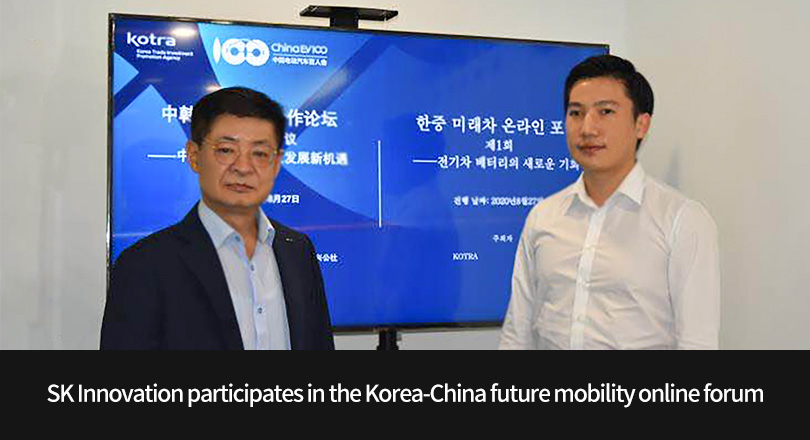Is a Second Shale Revolution on the Horizon?
2025.01.21
 INSIGHT
INSIGHT
Future mobility, particularly electric vehicles employing eco-friendly power sources, continue to increase their market shares thanks to technological advancements and policy support from countries around the world and stand at the center of the automotive paradigm shift. Of the recent industrial trends in China, new energy vehicles, which represent electric vehicles, cannot be excluded. According to China Industry Information, the market size of China’s new energy vehicles increased from 600,000 units in 2017 to 1.05 million units in 2018 and is expected to sell 2.01 million units this year.
Amidst all this, on August 27th, SK Innovation was invited as a representative battery company in Korea to give a presentation at the Korea-China future mobility Online Forum (hereinafter referred to as “forum”) that was held jointly by KOTRA and China EV100, a professional association in the field of future mobility in China. The main purpose of this forum is to strengthen the cooperation between Korea and China in line with the rapidly changing automobile market trends from the internal combustion engine to future mobility.
Due to the social distancing protocols of COVID-19, the forum was held online, connecting the Beijing KOTRA office and other locations simultaneously. 113 participants joined the virtual forum including Park Hanjin, the head of the Chinese regional headquarters of KOTRA, Zhang Yongwei, the Chief Secretary of China EV100, and Yoo Sibok, the head of the Korea Automotive Technology Institute and more from organizations and companies from both countries such as SK Innovation, China Automotive Technology and Research Center (CATARC), NIO BaaS, and China Potevio.

▲ SK Innovation gives an online presentation at the Korea-China future mobility Forum at the Beijing KOTRA Office
The forum is an event to establish a value chain in the field of future mobility of Korea and China, and to discover the demand for new business cooperation between representative companies in the electric vehicle industry in both countries by sharing the current state of the industry and technology and introducing the business of each company.
During his speech at the beginning of the event, Park Hanjin, the head of the Chinese regional headquarters of KOTRA, emphasized that battery is the key to the future mobility industry. He also mentioned Korean companies such as SK Innovation as the leaders of the battery business. In addition, Park urged Korean and Chinese companies to cooperate for the development of the electric vehicle industry.
After the opening speech, the forum went on with the introduction of the road map of Korean automobiles with the history and current status of Korea’s autonomous vehicle development, as well as a blueprint for the future. The China Automotive Technology and Research Center continued by analyzing China’s hydrogen energy and fuel cell industries. In addition, the so-called “Tesla of China” electric vehicle company NIO BaaS gave a presentation on the current status of the BaaS(1) business-related technologies that have Vehicle Battery Separation as the key condition.
(1) BaaS: Battery as a Service

▲ SK Innovation gives an online presentation at the Korea-China future mobility Forum at the Beijing KOTRA Office
At the forum, SK Innovation introduced its battery and material business – the new growth engine of the company, as well as the current status and strategy of the Chinese battery business. The company also shared the know-how it has accumulated in the electric vehicle battery business field. Notably, SK Innovation received the attention of other participants by introducing the technology that commercialized NCM 622 and 811(2) batteries for the first time in the world, which is one of SK Innovation’s core competencies. SK Innovation added to its presentation a brief introduction regarding BEST, a battery cell plant built in Changzhou, Jiangsu Province in China, in partnership with Beijing Automotive Industry Holdings and Beijing Electronics Holding. Moreover, the Chinese business officials who participated in the forum demonstrated their willingness to cooperate and participate as they actively shared their opinions.
(2) NCM 622 and 811: batteries with a nickel-cobalt-manganese ratio of ‘6:2:2’ and ‘8:1:1’, respectively.
Park Hanjin, the head of the Chinese regional headquarters of KOTRA, said, “Through the online forum, we identified the demand for future mobility cooperation between Korea and China and sought a mutually beneficial strategy. We will try our best to give our support so that more Korean future mobility companies can enter the Chinese market.”